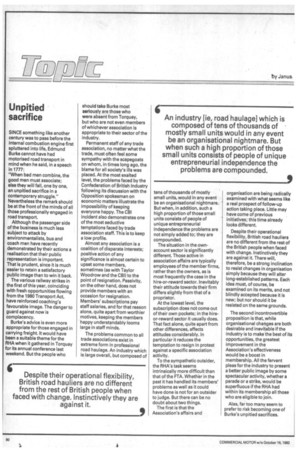Unpitied sacrifice
Page 50

If you've noticed an error in this article please click here to report it so we can fix it.
SINCE something like another century was to pass before the internal combustion engine first spluttered into life, Edmund Burke cannot have had motorised road transport in mind when he said, in a speech in 1777: "When bad men combine, the good men must associate; else they will fall, one by one, an unpitied sacrifice in a contemporary struggle." Nevertheless the remark should be at the front of the minds of all those professionally engaged in road transport.
Although the passenger side of the business is much less subject to attack by environmentalists, bus and coach men have recently demonstrated by their actions a realisation that their public representation is important. That is prudent, since it is much easier to retain a satisfactory public image than to win it back.
The various railway strikes in the first of this year, coinciding with fresh opportunities flowing from the 1980 Transport Act, have reinforced coaching's favourable image. The danger to guard against now is complacency.
Burke's advice is even more appropriate for those engaged in carrying freight. It would have been a suitable theme for the RHA when it gathered in Torquay for its annual conference last weekend. But the people who should take Burke most seriously are those who were absent from Torquay, but who are not even members of whichever association is appropriate to their sector of the industry.
Permanent staff of any trade association, no matter what the trade, must often feel some sympathy with the scapegoats on whom, in times long ago, the blame for all society's ills was placed. At the most exalted level, the problems faced by the Confederation of British Industry following its discussion with the Opposition spokesman on economic matters illustrate the impossibility of keeping everyone happy. The CBI incident also demonstrates one of the most seductive temptations faced by trade association staff. This is to keep a low profile.
Almost any association is a coalition of disparate interests; positive action of any significance is almost certain to upset some members, sometimes as with Taylor Woodrow and the CBI) to the point of resignation. Passivity, on the other hand, does not provide members with an occasion for resignation. Members' subscriptions pay staff salaries, and for that reason alone, quite apart from worthier motives, keeping the members happy understandably looms large in staff minds.
The problems common to all trade associations exist in extreme form in professional road haulage. An industry which is large overall, but composed of tens of thousands of mostly small units, would in any event be an organisational nightmare. But when, in addition, such a high proportion of those small units consists of people of unique entrepreneurial independence the problems are not simply added to; they are compounded.
The situation in the ownaccount sector is significantly different. Those active in association affairs are typically employees of the member firms, rather than the owners, as is most frequently the case in the hire-or-reward sector. Inevitably their attitude towards their firm differs slightly from that of a proprietor.
At the lowest level, the subscription does not come out of their own pockets; in the hireor-reward sector it usually does. That fact alone, quite apart from other differences, affects attitudes considerably. In particular it reduces the temptation to resign in protest against a specific association activity.
To the sympathetic outsider, the RHA's task seems intrinsically more difficult than that of the FTA. Whether in the past it has handled its members' problems as well as it could have done is not for an outsider to judge. But there can be no doubt about two things.
The first is that the Association's affairs and organisation are being radically examined with what seems like a real prospect of follow-up action taking place. Little may have come of previous initiatives; this time already looks different.
Despite their operational flexibility, British road hauliers are no different from the rest of the British people when faced with change. Instinctively they are against it. There will, therefore, be a strong inclination to resist changes in organisation simply because they will alter long-established patterns. Each idea must, of course, be examined on its merits, and not blindly accepted because it is new; but nor should it be resisted on the same grounds.
The second incontrovertible proposition is that, while organisational changes are both desirable and inevitable if the industry is to make the best of its opportunities, the greatest improvement in the Association's effectiveness would be a boost in membership. All the fervent pleas for the industry to present a better public image by some spectacular activity, whether a parade or a strike, would be superfluous if the RHA had within its membership all those who are eligible to join.
Alas, far too many seem to prefer to risk becoming one of Burke's unpitied sacrifices.




















































































